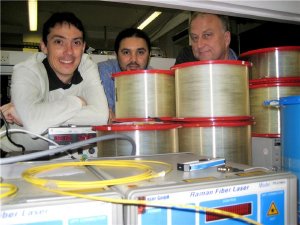Dec 15 2009
A 270km optical fiber has been transformed into the world's longest laser, a feat its inventors believe will lead to a radical new outlook on information transmission and secure communications.
 World's longest laser - channelled through 270km fiber optic cable
World's longest laser - channelled through 270km fiber optic cable
Engineering academics at Aston University, UK, are leading research into ultralong fiber lasers, to create a platform capable of delivering‘next generation’ information transmission, including telecommunications and broadband.
When normal telephone conversations or data sent over the internet are converted to light in order to travel through standard optical fibers the signals lose around 5 per cent of their power for every kilometre that they travel. The signals then have to be amplified to ensure that they reach their destination, a process which creates background noise and affects the signals quality.
Using a physical process called the Raman effect*, a natural phenomenon that affects light passing through a material and fiber Bragg gratings to reflect light at both ends of the fiber, the team can create a uniform distribution of light through a cavity in the optical fiber. This scheme also presents an ultra-long fiber laser offering new opportunities for handling ultra-fast communications at a high operational capacity.
Professor Sergei Turitsyn from Aston University’s Photonics Research team believes the 270km Ultralong Raman Fiber Laser, (the result presented in a recent issue of Physical Review Letters), has pushed laser technology to completely new territories. It increases by a factor of three the Research team’s previous record result with laser of 75km, reported in 2006.
The UK team have been collaborating with the Instituto de Optica, Madrid, Spain and Institute of Automation and Electrometry, Novosibirsk, Russia to achieve this record result.
“The demands on communication systems are increasing significantly, particularly with the huge growth of internet traffic. This technology offers a new platform for improving the speed, reliability and the operational capacity of future optical communication systems,” said Prof Turitsyn. “However, even more interesting is a fundamentally new way the laser is used - as a transmission medium, rather than a source of coherent radiation. Despite extraordinary advances in laser science, only recently have the fundamental limits of laser cavity length become an area of exploration. One important new concept here is that an ultra-long laser cavity implemented in optical fiber can be seen as a new unique type of a transmission medium. This might lead to a radical new outlook on information transmission and secure communications.”
http://scitation.aip.org/getpdf/servlet/GetPDFServlet?filetype=pdf&id=PRLTAO000103000013133901000001&idtype=cvips&prog=normal